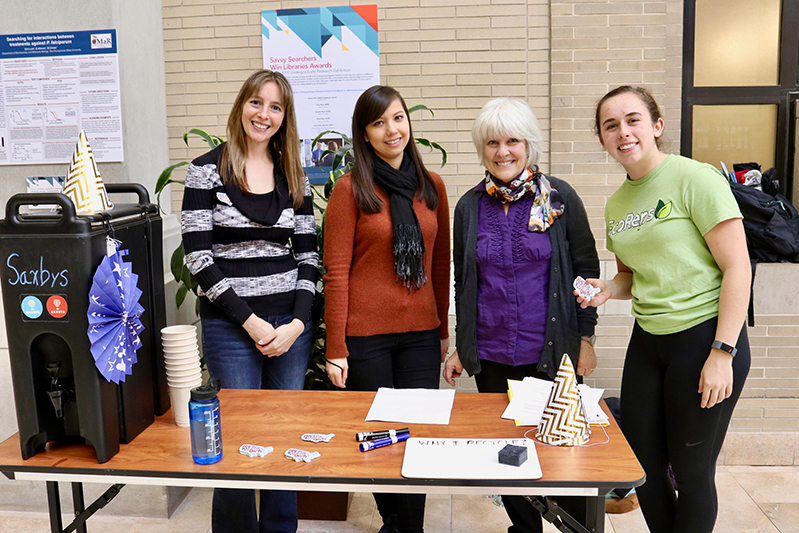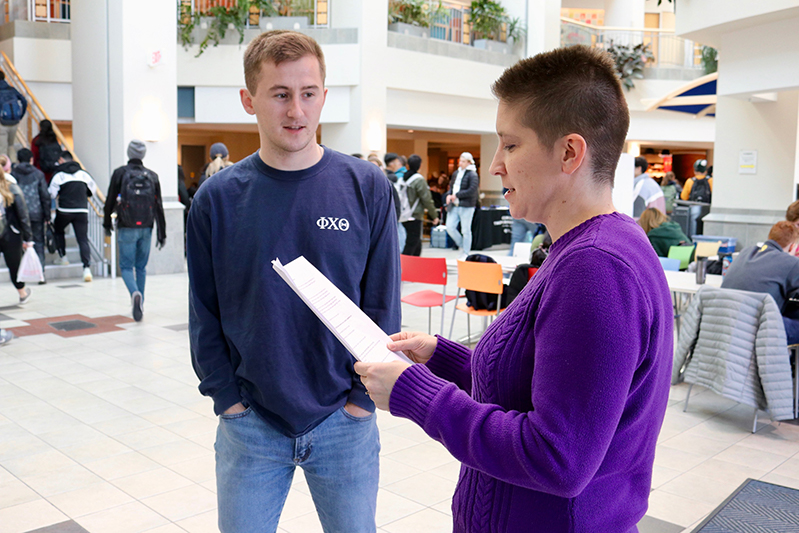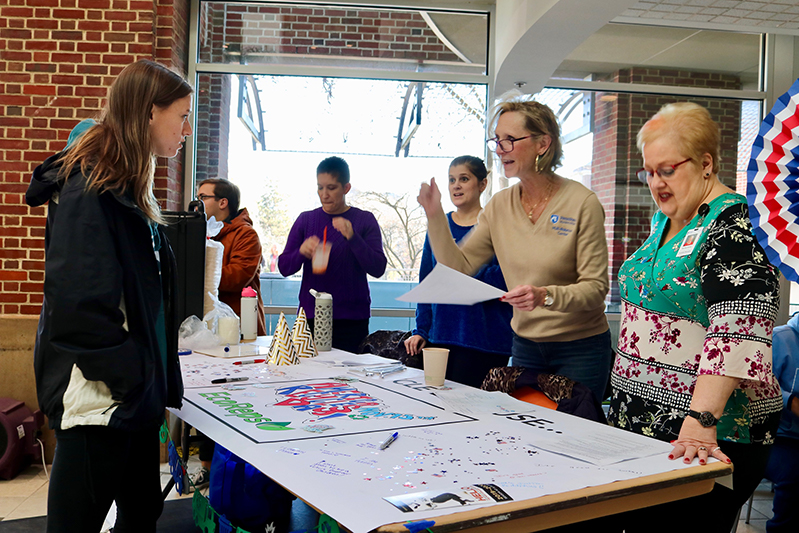Overview
What is a Green Team?
Green Teams are groups of faculty, staff, and students volunteering to engage and educate their peers to help their organization (college, department, building, etc.) operate in a more efficient, innovative, and healthy way. Typically, Green Teams focus on making their operations more sustainable through initiatives unique to their departments and/or the easy to follow Green Paws Program. Currently, the University has 30 Green Teams operating in various colleges and units and 11 of them at the Commonwealth Campuses. This network of change agents work with the Colleges’ Sustainability Councils, which have been formed to strategically advance the University’s sustainability goals, matching the work to the College’s unique mission.
Penn State Sustainability sponsors the Green Team program and supports it with information, resources, and training. What initiatives are these teams working on? Check out the success pages.
See the tabs above for more on forming your own Green Team, signing up for an orientation session, learning resources, and locating a team in your unit. For more information contact Jack Rumery at jxr6164@psu.edu.
Benefits
The ability to work with co-workers to make positive change:
- It’s more effective (and more fun!) to work with others
- Connection to over 40 Green Teams across the Commonwealth
- Bring recognition to your unit for having a Green Team
- Communicate with a network of Green Teams and access SDG educational resources through our Teams channels.
- Invitation to Green Team gatherings and special training sessions
- Access to the best and latest information, resources, events and news available from Penn State Sustainability that can help you and your Green Team succeed.


How to Form A Green Team
- Contact Jack Rumery to arrange a meeting and answer any questions you have: sustainability@psu.edu
Update Information
To ensure that we provide your Green Team with the most accurate and up-to-date information, we ask that you let us know if there are any changes to your existing team. Please use this form to update the following:
- Green Team Name
- Green Team Leader Information
- Green Team Member Information
- Green Team Contact Information

Resources
Green Team Resources
With Green Teams on the front line of engaging others about sustainability, Penn State Sustainability aims to offer our Teams resources to broaden their understanding of these concepts and use to engage others in conversations about these topics. There are two types of resource banks below. First is an archive of the former newsletter for Green Teams, called AIR, which highlights short articles about sustainability achievements, inspirations, and bits of fun stats to share with your peers. Second is a host of materials, divided into nine categories that can be used to learn some basic information about each topic and for the Green Team to use to prompt conversations with your coworkers! Have fun exploring!
Orientation and General Resources
Resources by Category
Sustainability
The first step of ensuring an inclusive world is understanding the breadth of sustainability. How do we work together to create this better world? The United Nations has created 17 goals with measurable targets that enable nations across the globe to become more resilient. As you work through the below resources, you will learn that sustainability is more than just recycling and switching off the lights. It is an approach to decision-making that recognizes the interconnectedness of economic, social and environmental systems and is framed using a set of global goals and our University’s priorities to have positive, long-lasting impacts beyond our borders and for many years in the future.
Behavior Change
Transformation to a culture that values sustainability will require changes in perspective and action. Key to this process are awareness of the problem, ability and willingness to make a change and the motivation to do so. From all our unsuccessful New Year’s resolutions, we know that just having a willingness or knowledge won’t make the change happen. What can help the process are prompts, feedback, dynamic messages, setting goals and rewards. Check out the resources below to find information on how to combine these elements into behavior change campaigns.
Communications
On the surface, communicating about sustainability seems to focus on rallying people to address the topic through education, information, warning, and persuasion. However, at a deeper level, our varied experiences, mental and cultural models, as well as underlying beliefs and worldviews, influence how we communicate about sustainability. In general, accounting for where an individual is coming from is crucial to effective communication, and resources to aid engaging in this type of successful communication are outlined below.
Energy
Energy use is the largest driver of Penn State’s greenhouse gas emissions and it costs about $30 million annually to provide heat and air conditioning to our buildings, electricity that make our day to day work possible, and fuel for our vehicles. The Physical Plants at all of our campuses work consistently to increase efficiency of our buildings, which has reduced our energy use, but there are actions that Penn Staters can take to cut waste. The resources below can help you and your peers understand the impact that energy has on climate change both in our individual decisions, as well as with large scale operations.
Waste
While there are benefits to recycling, there are also many issues. Where possible, it’s best not to create waste in the first place. That’s where the Five R’s (Rethink, reduce, reuse, repurpose and recycle) come in. There are several versions of this framework, but the underlying values are the same. The Five R’s offer a fleshed out framework for thinking about the objects we bring into our lives and how we dispose of them. Awareness is a critical first step. With practice, this framework will become part of your everyday decision making process. Remember – every small action adds up!
Climate Change
Long-term changes in temperature and weather patterns are referred to as climate change. These changes in the most recent centuries have been caused by human activity—primarily the combustion of fossil fuels like coal, oil, and gas. Climate change causes adverse effects on the planet, such as forest fires, increased drought and rising sea levels. In Pennsylvania, we are seeing the impact of climate change in the increased extreme weather events, such as intense rain storms which can cause flooding; a rise in Lymes disease due to warmer winters, and more frequent deaths due to intense summer heat events. The below resources outline in depth what climate change is, what it means for our planet and people, and steps the Centre county region is planning to prepare for adaptation.
Water
The focus in this section is water, the life blood of life. Pause for a moment and look around to consider how water connects to everything around us. Up to 60 percent of the adult human body is water and it is essential for survival. Sometimes we take this resource for granted and it is in times of drought, or pollution driven shortages that we take time to consider its value. In this section, we will pause to consider how we use this resource.
Did you know that only 2.5 percent of our planet’s water is fresh and we depend on this water for growing crops, cooling our power plants, hydrating our bodies, caring for our animals, bathing and producing materials. Reducing water use, either through conservation or preventing leaks decreases the stress on our local water supplies. Consider adopting sustainable habits such as not leaving the water running when washing the dishes, brushing your teeth, and watering your garden.
Environmental Justice
Environmental racism is a form of systematic racism in which marginalized communities are plagued with excessive environmental hazards in comparison to more privileged communities. Environmental justice aims to highlight these wrongs, and bring all people and communities equal environmental protection. The below resources can help us understand the full extent of what environmental justice means and how certain communities face disproportionate amounts of injustices.
Biodiversity
The variety of animals, plants, fungi, and microorganisms that make up our natural world are all included in what is known as biodiversity. All of these critters collaborate in complicated web-like ecosystems to keep nature in balance and support life. We cannot have the healthy ecosystems that we depend on to give us the oxygen we breathe and the food we consume without a diverse variety of animals, plants, and microbes. The resources outlined below showcase what biodiversity means in terms of benefitting our planet.
Existing Teams
Green Team Resources
| Green Team | Contact(s) | |
| Abington Environmental Conservation Objective (ECO) & Interdisciplinary Environmental Action (IDEA) |
Shelly Grinar | |
| Abington Sustainability Council | Peter Hornberger | Katie Odhner |
| Altoona DUS Advising Green | Joy Frank | |
| Altoona Sustainability Council | Andrew Mack | |
| Beaver Sustainability Council | Carey McDougall | |
| Behrend Sustainability Committee | Sherri Mason | |
| Berks Green Team | Mahsa Kazempour | |
| Brandywine Sustainability Commission | Mark Boudreau | Julie Stanton |
| DEVinitely Green Hershey | Samantha Moore | |
| DuBois | Michele Joseph | |
| Fayette Chancellor’s Office | Billie Jo Yuhaniak | |
| Fayette Green Team | Barry Polowski | |
| Great Valley Sustainability Council | Becky Stanko | |
| Greener Allegheny | Louise Aravich | Lorraine Craven |
| Lehigh Valley | Denise Ogden | Karen Kackley-Dutt |
| Harrisburg Sustainability Council | Rick Ciocci | |
| Mont Alto Sustainability Committee | Kristi Addleman | Charlene Saeman |
| New Kensington | Ruth Herstek | |
| Schuylkill | Julie Meyer | Mary Ann Smith |
| ShenanGO GREEN | Tony Paglia | Tammy D’Artenay |
| Scranton Sustainability Council | Teresa Black | Gene Grogan |
| Wilkes-Barre Sustainability Council | Erin Brennan | Susan Gross |
| PS York Sustainability Council | Fulgentius Lugemwa | |
| Green Teams at University Park | Contact(s) | |||
| Administrative Units: | ||||
| BURSAR: Better Understanding Recycling, Sustainability, and Resources | Kelley McCord | |||
| Educational Equity | ||||
| Values in Action (VIA) Team | Debra Thurley | |||
| Green Innovations – Investment Office | Karen Hammel | |||
| Office of Student Aid | ||||
| Office of the President Green Team | Marissa Shamrock | |||
| Office of the University Registrar | ||||
| Research Accounting | Cissy Reese | |||
| University Libraries | Harlan Ritchey | |||
| Human Resources: | ||||
| Bennett Family Center | Kendra Adkins | |||
| Hort Woods | Jaylene Manuel | |||
| Finance and Business: | ||||
| Housing | David Manos | |||
| Office of Physical Plant | ||||
| Parking Office/ Tranportation | Cecily Zhu | |||
| Procurement | Becky Fike | |||
| Residential Dining | Jaime Robinson | |||
| Outreach (UP) | ||||
| Shaver’s Creek Environmental Center | Brian Sedgwick | |||
| Penn State Arboretum | Jenn Hooven | |||
| Student Affairs: | ||||
| Old Main & Career Services | Jane Millar | Katrena Keeler | ||
| CAPS Mini Green Team | Susanna Hummer | |||
| Center for Spiritual and Ethical Development | Rachel Galloway | |||
| HUB Green Team | Mary Edgington | Jennifer Keen | ||
| Residence Life | Heide Port | John Hurst | ||
| Boucke | ||||
| University Health Services | Michele Brown | |||
| Campus Recreation | Jason Erdman | |||
| Academic Colleges & Institutes: | ||||
| Agriculture | ||||
| Plant Pathology & Environmental Microbiology | Judy Sinn | |||
| Zero In (Ag Engineering) | Chris Costello | |||
| Arts and Architecture | ||||
| Arts & Architecture Green Team | Deborah Gulick | Brendan Berthold | Keith Brainard | Nina Bumgarner |
| Communications | ||||
| COMMunity Green Team | ||||
| DUS Green Team | ||||
| Earth & Mineral Sciences | ||||
| Dutton e-Education Institute Green Team | Matt Bugaj | |||
| Earth & Environmental Systems Institute | Sarah Potter | |||
| EMS Deans Office | Karen Royer | |||
| EMS Ryan Family Student Center | Michael Gordon | |||
| Energy and Mineral Engineering Department | ||||
| Energy Institute | Jennifer Matthews | |||
| Geography Department | Lucille Laubenstein | Jodi Vender | ||
| Geosciences Department | Suzanne Godissart | |||
| Materials Science and Engineering Department | Seda Oturak | |||
| Meteorology & Atmospheric Science Department | Marisa Ferger | |||
| Education | ||||
| College of Education | Boni Richardson | |||
| Engineering | ||||
| College of Engineering Green Team | David Jones | Lauren Rodgers | ||
| Health and Human Development | ||||
| Nutrition | Denise Lawson | |||
| Shaver’s Creek Environmental Center | Brian Sedgwick | |||
| Information Sciences and Technology | ||||
| IST Building Green Team | Lisa Crownover | |||
| Liberal Arts | ||||
| College of Liberal Arts Sustainability Council | Austin Boyle | |||
| Psychology Department Green Team | Nick Pearson | |||
| Pond Lab Green Team | Allison Haas | |||
| Medicine | ||||
| College of Medicine Green Team | Savannah Marshall | |||
| Nursing | ||||
| Nursing Simulation Lab | Kristal Hockenberry | |||
| Science | ||||
| Biology | Howard Fescemyer | |||
| Chemistry Department | Russel Saieva | |||
| Institutes | ||||
| Land and Water Green Team | Lydia Vandenbergh | |||
| The Huck Green Team | ||||
| Summary | ||||
| University Park Green Teams | 48 | |||
| Commonwealth Campuses Green Teams/Sustainability Councils | 23 | |||
| Total Penn State Green Teams | 72 | |||
Successes
Penn State’s Green Teams initiative officially began in the summer of 2009, and since then these volunteer groups have engaged their peers and worked to expand their understanding of sustainability. Their activities have covered topics from reduction of waste to recycling, health and energy, to biodiversity, spanning most of the SDG goals. Continue reading to learn more about the positive changes Green Teams have made to save resources, both financial and natural, and to improve the health and happiness of our community.
Communication’s “Freeshop”
The Communication Green Team’s freeshop was set up similarly to a yard sale around their building’s lobby. Office members donated their unwanted goods to the freeshop and the items were displayed for two days to find a new home. Almost all of the items were taken and the rest were able to be recycled. “I think the freeshop made faculty, staff and students more aware of the recycling efforts that are shaping the College’s sustainable culture,” said Johnson. “It also increased awareness of our GT’s presence in the College and allowed those participating to feel good about actually doing something instead of simply talking to raise awareness for sustainability.”



